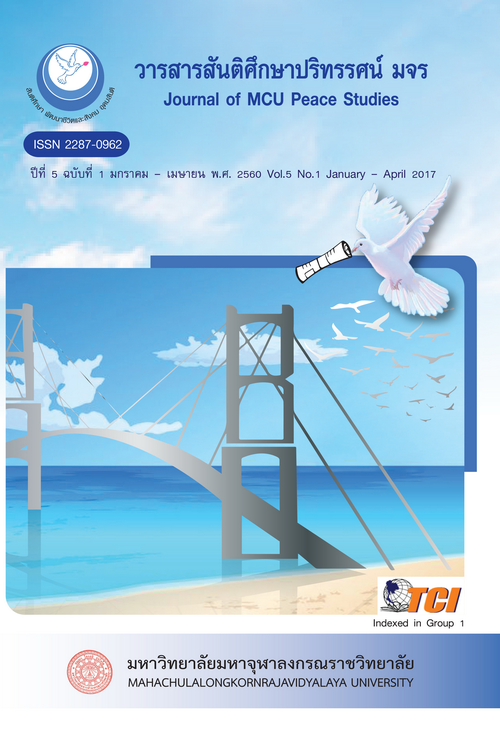The Devel0pment of Life Skills in Making Friendship in Buddhism
Main Article Content
บทคัดย่อ
The research entitled “The Development of Life Skills in Making Friendship in Buddhism” is to study the concept of the life skills in making friendship in line with Buddhism and to propose the model of the life skills development in making friendship in line with Buddhism. This is the documentary research and the depth interviews have been also done.
From the study, it can be found that the general concept of the life skills in making friendship means self-control in their own development in communication, the critical thinking, decision, dealing with feelings, adaptation and compassion to others. While the concept of the life skills in making friendship in line with Buddhism means self-training by the Brahmavihāra: Holy Abiding; Mettā (loving-kindness), Karunā (compassion), Muditā (sympathetic joy) and Upekkhā (equanimity). This Buddha-dhamma undoubtedly leads to the creation of good friendship. Last, the model of the life skills development in making friendship in line with Buddhism is the principles of self-development by the self-regulation based on Upekkhā (equanimity) for right livelihood, the recruiting friendship based on Mettā (loving-kindness) for recognizing good person, the building relationships with individuals selected based on Karunā (compassion) for realizing a friendship. Besides, the serving a friend and the determining alternative solutions based on Mettā (loving-kindness) is for making sacrifices, the maintaining a good friendliness and the dealing with fear and sadness based on Upekkhā (equanimity) is for showing goodwill, the adjusting themselves according the context of the community based on Muditā (sympathetic joy) is for self-improvement, and the estimating the behavior of friendliness and the understanding the needs of individuals consciously based on Karunā (compassion) is for being friendly to each other.
From the study, it can be found that the general concept of the life skills in making friendship means self-control in their own development in communication, the critical thinking, decision, dealing with feelings, adaptation and compassion to others. While the concept of the life skills in making friendship in line with Buddhism means self-training by the Brahmavihāra: Holy Abiding; Mettā (loving-kindness), Karunā (compassion), Muditā (sympathetic joy) and Upekkhā (equanimity). This Buddha-dhamma undoubtedly leads to the creation of good friendship. Last, the model of the life skills development in making friendship in line with Buddhism is the principles of self-development by the self-regulation based on Upekkhā (equanimity) for right livelihood, the recruiting friendship based on Mettā (loving-kindness) for recognizing good person, the building relationships with individuals selected based on Karunā (compassion) for realizing a friendship. Besides, the serving a friend and the determining alternative solutions based on Mettā (loving-kindness) is for making sacrifices, the maintaining a good friendliness and the dealing with fear and sadness based on Upekkhā (equanimity) is for showing goodwill, the adjusting themselves according the context of the community based on Muditā (sympathetic joy) is for self-improvement, and the estimating the behavior of friendliness and the understanding the needs of individuals consciously based on Karunā (compassion) is for being friendly to each other.
Article Details
รูปแบบการอ้างอิง
Chanthasaro, S., & Intanon, V. (2017). The Devel0pment of Life Skills in Making Friendship in Buddhism. วารสารสันติศึกษาปริทรรศน์ มจร, 5(1), 116–127. สืบค้น จาก https://so03.tci-thaijo.org/index.php/journal-peace/article/view/79270
ประเภทบทความ
บทความวิจัย
ทัศนะและความคิดเห็นที่ปรากฏในบทความในวารสาร ถือเป็นความรับผิดชอบของผู้เขียนบทความนั้น และไม่ถือเป็นทัศนะและความรับผิดชอบของกองบรรณาธิการ ยินยอมว่าบทความเป็นลิขสิทธิ์ของวารสาร


